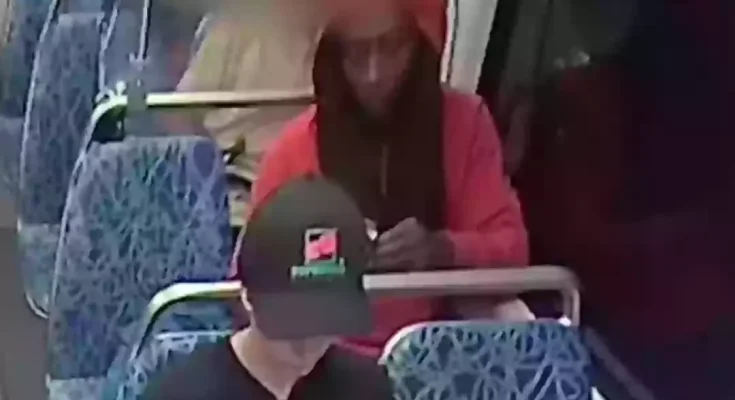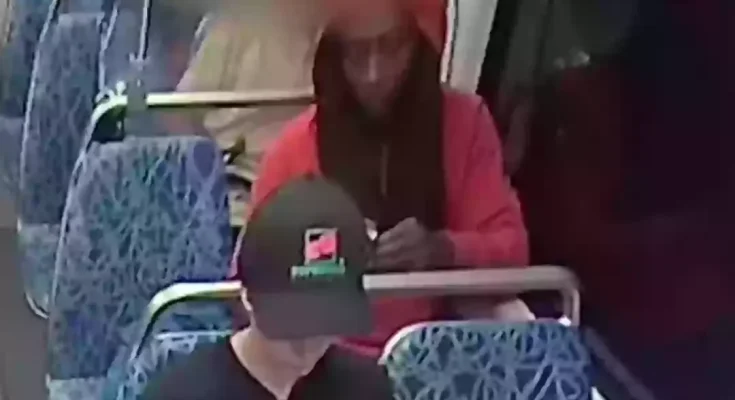The family of 23-year-old Ukrainian refugee Iryna Zarutska has spoken out in horror after she was brutally and randomly stabbed to death aboard a Charlotte light rail train on August 22.
Zarutska, who had fled Ukraine’s war in 2022, was working at a local pizzeria when she boarded the Lynx Blue Line light rail that evening. According to surveillance footage, she sat quietly—wearing her work uniform—when a stranger approached from behind, produced a knife, and began stabbing her without warning. She collapsed just minutes into the ride and died at the scene. The suspect, 34-year-old Decarlos Brown Jr., was arrested immediately after exiting the train. He faces charge of first-degree murder and a federal indictment for committing a crime aboard a mass transportation system that could carry the death penalty. U.S. officials, including Attorney General Pamela Bondi, have denounced the attack as a “terroristic act” and pledged to seek the maximum penalty, while the FBI has vowed that he will never be released. (“Iryna Zarutska was a young woman living the American dream … we will seek the maximum penalty for this unforgivable act of violence—he will never again see the light of day as a free man.”) (“The brutal attack … was a disgraceful act that should never happen in America.”)
Her family, through their lawyers, released a statement saying, “We are heartbroken beyond words. Iryna came here to find peace and safety, and instead her life was stolen from her in the most horrific way.” They added, “No family should have to go through this,” and they called on prosecutors to bring justice and address systemic failures in public safety. They also urged the public not to circulate the disturbing footage out of respect for Iryna’s memory.
Brown’s criminal history, including 14 previous arrests and a diagnosis of schizophrenia, has fueled public anger and political debate. His brother, Jeremiah, blamed the judicial system for failing to keep Iryna safe, saying, “He should suffer the consequences,” and adding, “He could do it again. They should still treat him for his mental issues but there are consequences for his actions.” He criticized the magistrate judge’s orders that allowed Brown’s release earlier in the year.
Charlotte leaders responded with grief and pledges for action. Mayor Vi Lyles called the loss “senseless and tragic” and asked that media and residents refrain from sharing the video. She announced plans to deploy more security on trains and platforms immediately. A statement from CATS confirmed that no security officers were in the car where the killing occurred, though officers were present in another car. Governor Josh Stein described the killing as “heartbreaking” and said more officers are needed to protect public transit.

Nationally, the White House seized on the case to critique Democratic–led criminal justice policies. White House Press Secretary Karoline Leavitt said, “This beautiful, innocent young woman had fled her country for a chance at a safer life … But tragically, the public transportation system … was more dangerous than the war zone she left behind.” She condemned “soft-on-crime” policies and called the tragedy “preventable.” Former President Trump echoed that message and blamed lax bail policies on Democrats for allowing Brown to roam free.
Public outcry also surged on social media. Some criticized bystanders for not intervening, though experts cautioned that confronting a knife attack without training could be deadly. Advocacy groups urged restraint in resharing graphic footage, pointing out that it adds trauma to a grieving family.
The killing has raised concerns for Charlotte’s refugee and Ukrainian communities. Iryna was remembered by friends as a gifted artist striving to build a new life in America. One friend recalled she “was always very helpful, very supportive and just had a heart of gold.” Her obituary noted her hope to become a veterinary assistant and her deep love of animals.
Community vigils sprang up near the pizzeria where she worked and at transit stations. Refugee groups lamented that Iryna was exactly the kind of person U.S. resettlement programs aim to protect—yet she fell victim to random violence.
Looking ahead, Brown faces hearings and legal battles on both state and federal fronts. Federal charges carry a potential death sentence; prosecutors seem intent on seeking maximum penalties. His defense is expected to raise his mental health history as a mitigating factor. Meanwhile, Charlotte transit officials are moving to increase security patrols, install more surveillance, and deploy fare inspections. City leaders have also convened community forums to restore trust and safety.
A GoFundMe set up for Brown has been swiftly removed for violating the terms of the fundraising site.
In the weeks since the murder, Iryna’s name has become central to calls for reform. Widely circulated posters bear her photo with messages urging kindness and vigilance. Petitions demanding better protections for public transit and stricter bail laws have gained signature traction.
The family, still grieving, seeks more than justice—they want Iryna’s memory honored and what happened to be a catalyst for real change. “No family should have to go through this,” they said.
The grief is personal, irreversible. For Charlotte and beyond, this tragedy is a test of whether systems within which vulnerable newcomers seek refuge can be trusted to deliver safety—not just promise it.




